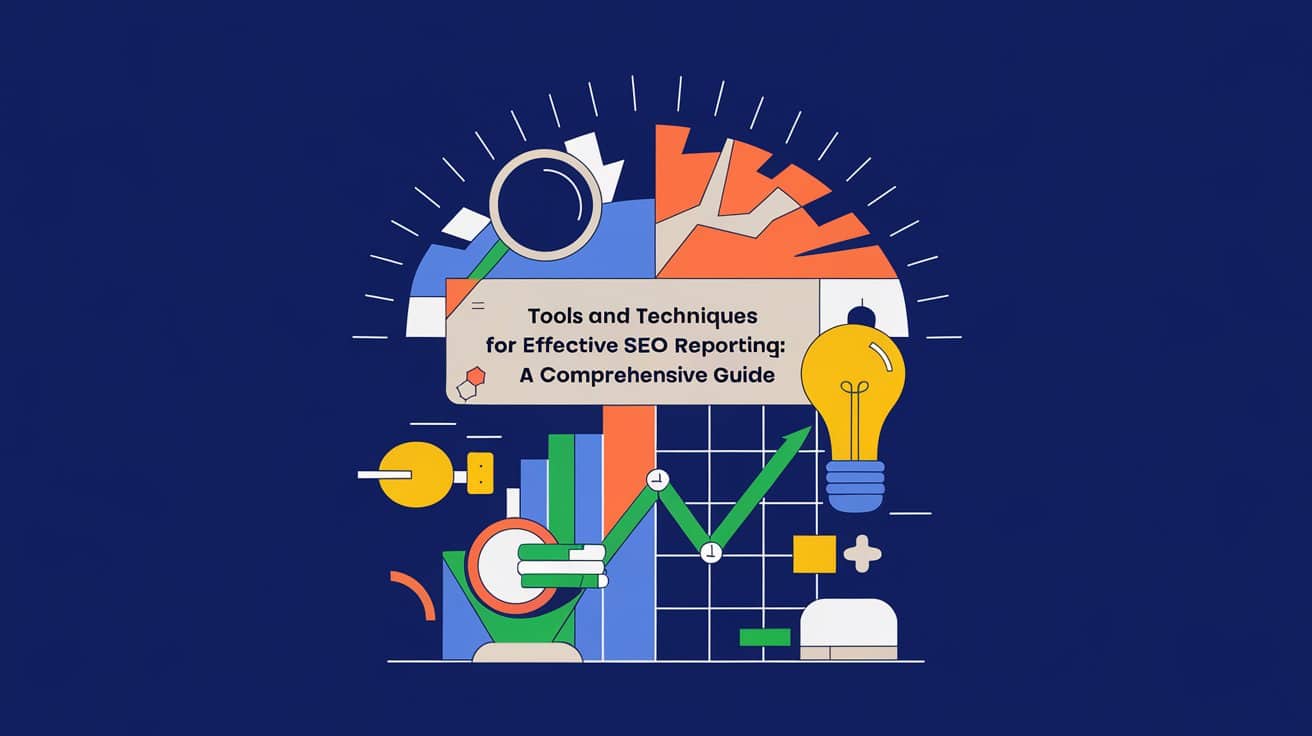Understanding SEO metrics is an essential part of any digital marketing strategy. SEO metrics help businesses track their website’s performance, identify areas for improvement, and measure the effectiveness of their SEO efforts. However, with so many metrics to choose from, it can be challenging to know which ones to focus on.
This guide aims to provide a comprehensive overview of SEO metrics and how to use them to report on meaningful data. It will cover the most important metrics that businesses should track, how to measure them, and how to use the data to make informed decisions. By the end of this guide, readers will have a better understanding of how to report on SEO metrics and how to use the data to improve their website’s performance.
Whether you’re a business owner, marketer, or SEO specialist, understanding SEO metrics is crucial for success. By tracking the right metrics and using the data to inform your decisions, you can improve your website’s visibility, attract more traffic, and ultimately drive more conversions. With this guide, you’ll have all the information you need to get started with meaningful SEO reporting.
Understanding SEO Metrics
SEO metrics are an essential part of any successful SEO campaign. These metrics help to measure the effectiveness of the campaign and provide insights into how to improve it. Understanding SEO metrics is crucial for any marketer or business owner who wants to achieve long-term success with their SEO efforts.
There are several important SEO metrics that marketers should be familiar with. One of the most important metrics is keyword ranking. This metric measures how well a website is ranking for specific keywords in search engine results pages (SERPs). Marketers should track their keyword rankings regularly to determine whether their SEO efforts are paying off and to identify opportunities for improvement.
Another important SEO metric is organic traffic. Organic traffic refers to the number of visitors who come to a website through organic search results. This metric is a good indicator of how well a website is performing in search engines and can help marketers identify areas where they need to improve their SEO efforts.
Other important SEO metrics include backlinks, bounce rate, and click-through rate (CTR). Backlinks are links from other websites that point to a website. Bounce rate measures the percentage of visitors who leave a website after viewing only one page. CTR measures the percentage of people who click on a link after seeing it in search results.
Marketers should use these metrics to track the success of their SEO campaigns and make data-driven decisions about how to improve them. By understanding SEO metrics, marketers can identify areas where they need to focus their efforts and make changes that will improve their website’s ranking in search engines.
Importance of SEO Metrics
SEO metrics are essential for any website to achieve its business goals. Measuring the success of an SEO campaign is crucial to determine whether it is delivering the desired results. By tracking and analyzing SEO metrics, businesses can identify areas of improvement and make data-driven decisions to optimize their website’s performance.
One of the most critical SEO metrics is the return on investment (ROI). It helps businesses to determine the effectiveness of their SEO campaign by comparing the revenue generated from the campaign to the amount spent on it. ROI is a crucial metric that enables businesses to make informed decisions about their SEO strategy and budget.
Another essential SEO metric is website traffic. It measures the number of visitors to a website and is an indicator of how well the website is performing. A high volume of traffic is desirable, but it is equally essential to ensure that the traffic is relevant and engaged with the content on the website.
SEO metrics also help businesses to understand their audience better. By analyzing metrics such as bounce rate, time on site, and pages per session, businesses can gain insights into user behaviour and preferences. This information can be used to create a better user experience and improve the website’s overall performance.
In conclusion, understanding SEO metrics is crucial for any business that wants to succeed online. By tracking and analyzing these metrics, businesses can make data-driven decisions to optimize their website’s performance, achieve their business goals, and improve their ROI.
Key SEO Metrics to Track
To measure the success of a website’s SEO performance, it is essential to track the right metrics. Here are the key SEO metrics that one should track to understand the website’s performance:
Organic Traffic
Organic traffic is the traffic that a website receives from search engines such as Google, Bing, or Yahoo. It is important to track organic traffic as it indicates the website’s visibility and its ability to attract visitors from search engines. Google Analytics is a popular tool that can be used to track organic traffic.
Keyword Rankings
Keyword rankings refer to the position of a website’s pages in the search engine results pages (SERPs) for specific keywords. Tracking keyword rankings is important as it helps to understand how the website is performing for specific search terms. Google Search Console is a free tool that can be used to track keyword rankings.
Backlinks
Off-site SEO, measured with backlinks are links from other websites that point to a website. Backlinks are an important ranking factor in search engine algorithms. Tracking backlinks helps to understand the website’s authority and popularity. Ahrefs, Moz, and SEMrush are popular tools that can be used to track backlinks and referring domains.
Technical SEO Metrics
Technical SEO metrics refer to the technical aspects of a website that affect its search engine visibility. Site speed, mobile-friendliness, and Core Web Vitals are some of the important technical SEO metrics that should be tracked. Google Search Console and Google Analytics are useful tools that can be used to track technical SEO metrics.
In conclusion, tracking the right SEO metrics is critical to understanding a website’s performance and making data-driven decisions to improve its visibility and attract more traffic. By tracking organic traffic, keyword rankings, backlinks, and technical SEO metrics, website owners can gain valuable insights into their website’s SEO performance and take the necessary steps to improve it.
Interpreting SEO Data
When it comes to SEO, data is the backbone of a successful campaign. Understanding how to collect, analyze and interpret data is essential to make informed decisions. In this section, we will look at some of the key metrics to analyze when evaluating SEO data.
Understanding Google Analytics Reports
Google Analytics is a powerful tool that provides valuable insights into website traffic and user behavior. Some of the key metrics to analyze in Google Analytics reports include sessions, session duration, and bounce rate. Sessions refer to the number of visits to a website, while session duration is the average length of time a user spends on the site. Bounce rate is the percentage of users who leave the site after visiting only one page. By analyzing these metrics, website owners can gain insights into how users are interacting with their site and make improvements to increase engagement.
Analysing Keyword Performance
Keyword research is an essential part of any SEO campaign. By analyzing keyword performance, website owners can determine which keywords are driving traffic to their site and which ones are not. Google Search Console is a valuable tool for analyzing keyword performance. It provides data on search volume, click-through rates, and impressions for each keyword. By analyzing this data, website owners can identify opportunities to optimize content and improve rankings.
Evaluating Backlink Profile
Backlinks are an important factor in SEO. They are links from other websites that point to a website. The quality and quantity of backlinks can have a significant impact on search engine rankings. Evaluating the backlink profile of a website involves analyzing the number of backlinks, the referring domains, and the quality of those links. Tools like Ahrefs, Moz, and SEMrush can help website owners evaluate their backlink profile and identify opportunities for improvement.
In conclusion, interpreting SEO data is essential to make informed decisions and improve search engine rankings. By analyzing metrics like sessions, session duration, bounce rate, keyword performance, and backlink profile, website owners can gain valuable insights into how users are interacting with their site and make improvements to increase engagement and drive traffic.
SEO Reporting
SEO reporting is an essential component of any SEO strategy. It is a way to measure the effectiveness of your SEO efforts and to communicate the results to stakeholders. In this section, we will discuss how to create meaningful SEO reports, visualise SEO data, and report on SEO metrics to clients.
Creating Meaningful SEO Reports
When creating an SEO report, it is important to focus on the metrics that matter most to your company. This may include metrics such as organic traffic, keyword rankings, and backlink profile. To ensure that your report is meaningful, it is important to provide context for the metrics you are reporting on. For example, if organic traffic has increased, it is important to explain why this is significant and how it relates to your overall SEO strategy.
Another important aspect of creating meaningful SEO reports is to provide actionable insights. This means going beyond simply reporting on metrics and providing recommendations for how to improve them. For example, if keyword rankings have dropped, it is important to provide suggestions for how to improve them, such as by creating more targeted content or building more high-quality backlinks.
Visualising SEO Data
Visualising SEO data can be a powerful way to communicate results to stakeholders. This can include graphs, charts, and other visualisations that make it easier to understand complex data. When visualising SEO data, it is important to choose the right type of visualisation for the data you are presenting. For example, line graphs may be useful for showing trends over time, while bar charts may be better for comparing different metrics.
SEO Reporting for Clients
When reporting on SEO metrics to clients, it is important to focus on the metrics that matter most to them. This may include metrics such as leads generated or revenue generated from organic search. It is also important to provide context for the metrics you are reporting on and to provide actionable insights for how to improve them.
When reporting on SEO metrics to clients, it can be helpful to use a combination of visualisations and written explanations to communicate results. This can help to ensure that clients understand the data and are able to make informed decisions about their SEO strategy.
In order to create effective SEO reports for clients, it is also important to have a clear understanding of their goals and objectives. This can help to ensure that the metrics you are reporting on are aligned with their business objectives and that your recommendations are tailored to their specific needs.
SEO Strategy and Goals
A successful SEO strategy starts with setting clear goals that align with the business goals of the organisation. Without clear goals, it is difficult to measure the ROI of SEO efforts and evaluate the performance of SEO campaigns.
Setting SEO Goals
The first step in setting SEO goals is to identify the business goals that SEO can help achieve. For example, if the business goal is to increase revenue, the SEO goal could be to generate more leads through organic search. Once the business goals have been identified, specific and measurable SEO goals can be set.
Measuring SEO ROI
Measuring the ROI of SEO efforts is essential to determine the effectiveness of the SEO strategy. ROI can be measured by calculating the revenue generated from organic search and comparing it to the cost of SEO efforts. To accurately measure ROI, it is important to track the source of leads and revenue generated from organic search.
Evaluating SEO Campaign Performance
Evaluating the performance of SEO campaigns is crucial to identify areas for improvement and make data-driven decisions. Key Performance Indicators (KPIs) such as organic traffic, keyword rankings, and backlinks can be used to evaluate the performance of SEO campaigns. It is important to regularly review and analyse these KPIs to determine the effectiveness of the SEO strategy and make necessary adjustments.
Overall, a clear SEO strategy with specific goals and a focus on ROI and performance evaluation is essential for achieving success in organic search.
Conclusion
In conclusion, understanding SEO metrics is crucial for any business or website owner who wants to improve their online presence. By monitoring and analysing key metrics, businesses can make informed decisions about their SEO strategy and ensure that they are achieving their goals.
One important aspect of SEO metrics is understanding the difference between vanity metrics and actionable metrics. Vanity metrics, such as page views or social media followers, may look impressive but do not necessarily translate into business success. Actionable metrics, on the other hand, are specific and measurable indicators of success, such as conversion rates or organic search traffic. By focusing on actionable metrics, businesses can make data-driven decisions that lead to real results.
Another important consideration when it comes to SEO metrics is the importance of context. Metrics do not exist in a vacuum and must be analysed in relation to other factors, such as changes to the website or external events. For example, a sudden drop in traffic may be the result of a technical issue rather than a problem with the SEO strategy. By taking a holistic approach to SEO metrics, businesses can ensure that they are getting a complete picture of their online performance.
Finally, it is important to remember that SEO is an ongoing process. Metrics should be monitored regularly and adjustments made as necessary. By keeping a close eye on key metrics, businesses can stay ahead of the competition and ensure that they are achieving their goals.







